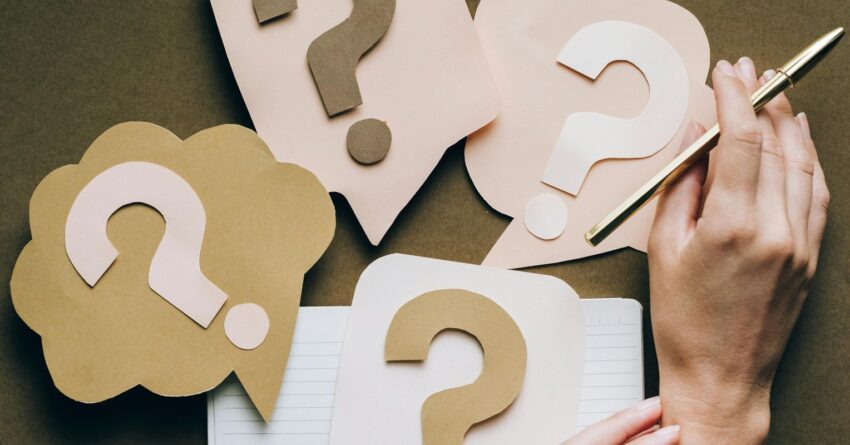All forms of anxiety really boil down to an intolerance of uncertainty. Your mind presents you with some sort of question related to something you feel uncertain about and tells you that the safe, responsible thing to do is to try to answer the question. To use an example, let’s take the thought: “What if I have cancer and I just don’t know it?”
When this thought pops up, you feel uncertain about whether you have cancer and this triggers anxiety. What the anxiety is telling you to do in this moment is to try and get certainty. So you feel compelled to try to answer the question.
This leads to the behavior of worry, which means mentally analyzing and trying to answer a question that you feel uncertain about.
Most worry questions typically come in one of these three forms:
1. Will the bad thing happen?
In other words, your mind demands that you try to predict the future.
2. If the bad thing happens, how bad will it be?
Again, this is trying to predict the future. Your mind demands that you know exactly what will happen if the bad thing does occur. Your mind wants you to predict all the potential consequences of it. This is where catastrophizing comes in, because if you get really creative, which the anxious mind does, you can come up with a million different horrible consequences for pretty much anything that could possibly come true.
3. What should I do to stop the bad thing from happening?
This one really hooks people because it feels like you’re doing something useful by worrying about this. You are basically saying, “Surely if I worry hard enough, I can figure out how to stop the bad thing from happening!”

Source: Photo by SHVETS production from Pexels
The problem with trying to achieve certainty is that it is ultimately impossible:
No matter how much you analyze it, you cannot know for certain whether the bad thing will happen.
No matter how much you analyze it, you cannot know for certain what the consequences of the bad thing will be.
No matter how much you analyze it, you cannot know for certain if you can stop the bad thing from happening.
Not only is achieving certainty impossible, but the effort to achieve certainty through worry leads to more and more anxiety too.
One of the most important things in therapy for anxiety is trying to build a friendlier relationship with uncertainty. Whether you like it or not, the truth is that uncertainty is a normal, natural, and unavoidable part of life.
There are certain things that are just ubiquitous in the world. Air is a good example. Air is everywhere. You are never going to get away from air. It would be ridiculous to wake up one day and say I don’t like air anymore, I’d like to have less air in my life. Uncertainty is like air. It is ubiquitous in the world, it is everywhere, all the time.
There is almost nothing in life that we can be 100% certain of. You can fight against this aspect of reality, you can lament it, and you can try to eliminate the uncertainty, but none of that is going to matter: Ultimately, no matter how much you analyze your worry questions, you are not going to achieve certainty about them.
The healthy thing to do is to give up on the goal of trying to achieve certainty.
What you need is not reassurance that your worry is not going to come true. What you need is a healthier relationship with uncertainty.
It makes no sense to have an antagonistic relationship with air because it is everywhere and is unavoidable, right? Well it’s the same with uncertainty. Uncertainty is everywhere and is unavoidable. It’s a normal, natural part of life. It makes no sense to have an antagonistic relationship with uncertainty.
So how do you make friends with uncertainty? You embrace uncertainty. You lean into it. When a worry question pops into your mind, you fully commit to leaving it unanswered. You say “I don’t need to answer this, I eat uncertainty for breakfast!”
So when that worry question pops in your mind, “Do I have cancer right now and I just don’t know it?”, the most helpful response to that is not to reassure yourself of all the reasons it’s unlikely you have cancer. It’s not to try to figure out whether the things you’re feeling in your body could really be cancer. And it’s not to research types of cancer online.
No, the most helpful response is to acknowledge the uncertainty and redirect your attention onto what you’re actually doing in the present moment in front of you. So you can say to yourself, “Okay, maybe I have cancer and I don’t know it. But it is impossible for me to know that right now and so I’m not going to waste my time pointlessly trying to figure it out. I’ve got more important things to do with my time. I will instead move on with whatever’s next up in my day.”

Source: Photo by Anna Shvets from Pexels
If you’re having trouble getting yourself to commit to this kind of approach, just listen to what your experience tells you: When you try to answer a worry question, what actually happens? Do you end up feeling certain and reassured and then your mind is satisfied and the anxiety goes away? Of course not. Worrying makes you feel worse and you still end up uncertain anyway.
Use this knowledge from your experience to help you commit to not continuing the same process over and over. You don’t need yet another failed attempt at achieving certainty to convince you it’s time to give up on this.
When you give up on answering worry questions, it helps build a friendlier relationship with uncertainty and these types of thoughts will gradually bring up less and less anxiety over time.
